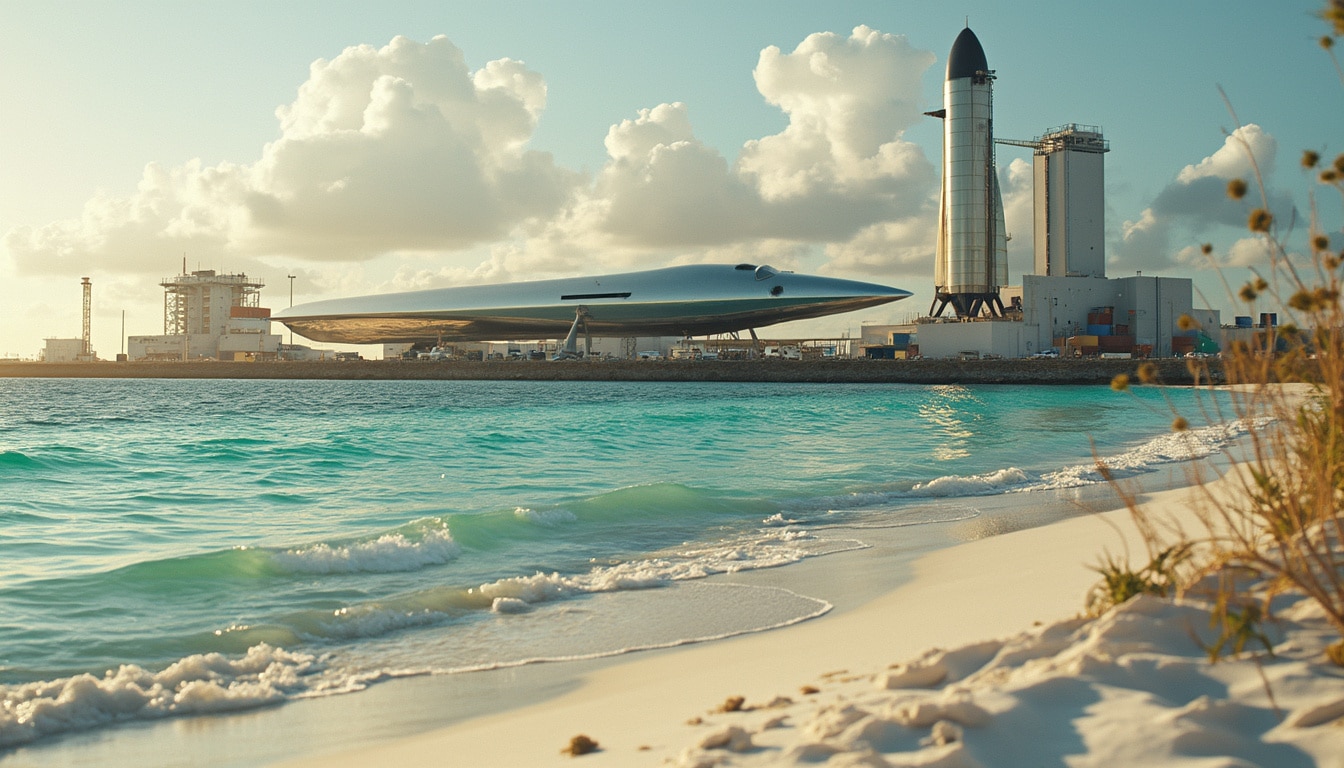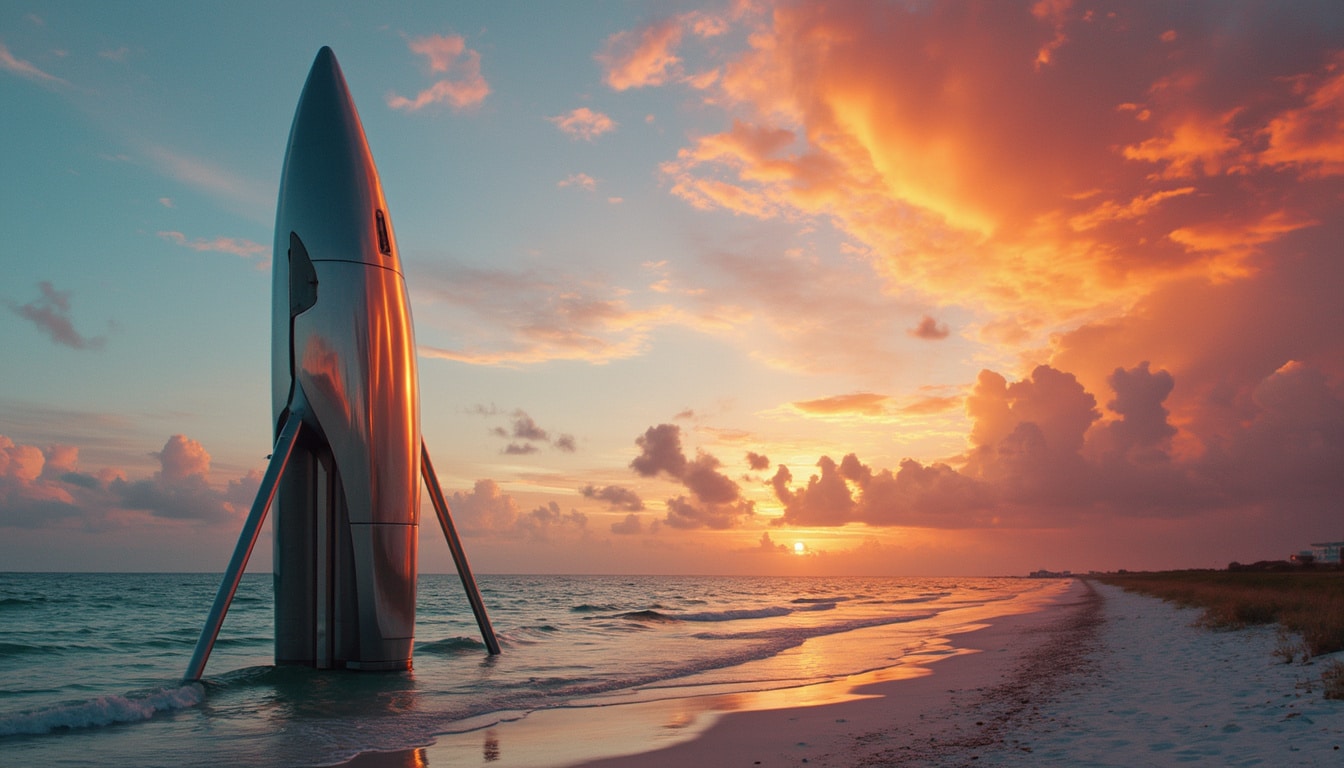In recent years, the landscape of South Texas has been dramatically altered by the presence of SpaceX and its ambitious plans for space exploration. With the launch of Super Heavy-equipped Starships on the horizon, the local community has entered a complex struggle over public access to its beloved beaches. As SpaceX aims to enhance its aerospace capabilities, the potential of exclusive beach access has triggered a wave of resistance from residents and environmental advocates alike. The proposed legislation in Austin that would grant SpaceX control over essential road closures around Boca Chica Beach has led to significant public outcry and fervent protests, casting a shadow on the company’s mission.
The tension revolves around the prospect of local authorities losing control over the only access road leading to Boca Chica Beach due to new bills passed in the Texas legislature. Proponents argue that adjusting the control of these closures is necessary for efficiency. Critics, however, fear that the community’s access to beach areas could be severely restricted, raising concerns about the environmental impact and the right to public spaces. As SpaceX prepares for more launches, the stakes are high for both the residents and the company.
The Emerging Conflict Over Boca Chica Beach
Ever since SpaceX established its launch facility near Boca Chica, it has seamlessly intertwined with the community dynamics of South Texas. The beach, not only an untouched natural hotspot but also affectionately known as “the poor people’s beach,” has become a point of contention as distancing concerns continue to amplify. This exclusive area attracts tourists and nature enthusiasts alike, increasing visibility and interest around SpaceX’s aerospace initiatives.

SpaceX’s Operations and Public Footprint
The operations at SpaceX’s Starbase consist of extensive launch preparations, engine test firings, and transportation of heavy machinery. These operations often necessitate sporadic closures of Highway 4, the sole route allowing access to Boca Chica Beach and its stunning landscapes. Looked at strategically, the temporary closures aim to protect public safety during significant space activities. However, they also impede access to the beach, leading to frustrations among residents and local beachgoers.
The area is home to not just breathtaking views but also a historical 150-year-old shipwreck and diverse flora and fauna that underscore the ecological significance of Boca Chica. Advocates argue that any move to restrict beach access compromises not just their enjoyment but the rich biodiversity of the region. Over the years, the local community has rallied against measures that risk over-commercializing their environment. Such sentiment is shared widely, as many continue to take pride in the unrestricted beauty of Texas’s coast.
Legislative Controversies Surrounding Beach Access
Two particularly contentious bills, House Bill 4660 and Senate Bill 2188, have initiated a storm of public dissent. Filed by state legislation, these bills propose transferring control of beach closures from county officials to SpaceX, raising alarms about who ultimately governs public resources. The bills aim to streamline administrative actions regarding closure due to launch activities, potentially favoring the company over the local population who have historically enjoyed access to the beach.
Rob Nixon, a local activist representing the Surfrider Foundation, voiced the concerns of many when he expressed that such measures would give SpaceX free reign to close access to Boca Chica whenever it sees fit. Nixon has repeatedly testified against these proposals, highlighting the adverse implications they may have on public access to the beach. Local lawmakers and public officials have similarly echoed these sentiments, labeling the new regulations as detrimental to the well-being and rights of residents.
Response from SpaceX and Local Officials
SpaceX representatives, including Kathy Leuders, general manager of Starbase, assert that the proposed actions are aimed at enhancing operational efficacy without compromising public access. The recurring theme from SpaceX’s side maintains that enabling quicker road closure responses is crucial for balancing public safety with their endeavors in aerospace. The contrasting narratives paint a picture of an environment where competing interests—economic growth through space ventures versus community welfare—clash head-on.
Despite assurances aimed at easing public concern, conflicts certainly lie beneath the surface. Many locals have grown distrustful, believing that SpaceX has increasingly prioritized its interests over their rights. The distrust is exacerbated by past incidents of limited access due to launch activities. The potential for transformation into a “company town” where SpaceX dictates community matters raises fears for many residents—especially regarding their cherished natural spaces.
The Environmental Impact and Community Resistance
The environmental ramifications of SpaceX activities in the area, combined with the proposed changes in management and oversight, represent a contentious battleground. As public outcry against exclusive rights gathers momentum, those opposing SpaceX’s control argue that trading ecological integrity for corporate gain ultimately detracts from community values. The overlap between future projects and conservation efforts remains unclear, igniting discussions around environmental protections in the context of rapid industrial development.
Many advocates and local residents have brought to light concerns regarding potential ecological degradation as launches become more frequent. The region’s unique ecosystems, characterized by delicate balance, could experience adverse effects due to increased industrial activity. Hence, there is a growing resistance against policies that seem to prioritize economic or corporate interests over preserving the health and integrity of their natural surroundings.
Building a Sustainable Future for All Parties
Navigating the crossroads of aerospace innovation and public beaches brings forth essential deliberations on sustainability and community welfare. While technological advancement holds potential benefits for the local economy and beyond, there might also exist alternative methods to include stakeholder perspectives—mitigating any adversarial dynamics that could arise. A potential bridge may lie in constructive dialogue between SpaceX and affected parties, keeping community needs at the forefront as they consider future plans.
Moreover, any successful partnership will need to extend assurances that both beach access and environmental integrity will remain safeguarded. Proponents for better collaboration have echoed calls for improved transparency and public engagement as potential solutions to dissipation and discord. Whether community concerns gain traction in Texas’s push for aerospace supremacy is yet to be determined, but the ongoing resistance clearly illuminates the complexities involved.
The Future of Boca Chica Beach and its Challenges
As SpaceX gears up for its journey into space, the landscape around Boca Chica Beach remains under pressure. The push for privatization of beach access, confronted by the ongoing resistance from locals, creates a rich tapestry of community dynamics worth safeguarding. Beach access signifies more than just a recreational opportunity; it reflects the emotional and historical ties the residents have established with the space surrounding them.
Discussions on greater public access have prompted a renewed focus on legislative efforts designed to maintain and regulate beach access as it continues to evolve alongside SpaceX’s ambitions. Attention is drawn toward legislative proposals that would protect local rights against encroaching corporate interests, emphasizing the need to balance economic and environmental priorities in an effective manner.
The Road Ahead for SpaceX and Local Interests
A call for action encourages the local community to remain vigilant and engage in deeper processes of advocacy against policies that compromise their autonomy over public resources. As the pursuit of innovation continues, understanding the dialogue about the future of space exploration and protecting the right to public access requires a collaborative approach. Building solutions will become more imperative in the face of changing landscapes and market dynamics. Resolving this clash of interests through bipartisan efforts and community-driven support will ultimately lead to a brighter tomorrow for Boca Chica Beach and its residents.

| Aspects | Public Access | SpaceX Operations | Legislative Context | Environmental Concerns |
|---|---|---|---|---|
| Access Control | Limited by road closures | Controls access for safety | Requires modifications to local governance | Risks ecological imbalance due to increased launches |
| Community Voices | Active in advocating for rights | Seeking efficiency in operations | Resistance from county officials and residents | Potential degradation of natural habitats |
| Long-term Impacts | Concerns over reduced access | Could become dominant player | Possibility of legislative restrictions | Continued environmental scrutiny expected |
As the community grapples with its alignment amidst technological ambition and steadfast advocacy for public rights, the journey ahead is one paved with both challenges and opportunities. Keeping the narrative alive regarding the needs for public access, regulating beach access, and stakeholder engagement will mark the future trajectory of Boca Chica’s discourse and its essence.




Leave a Reply